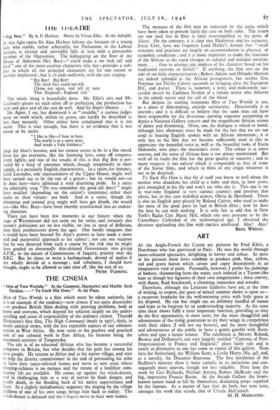THE CINEMA
" Men of Two Worlds." At the Gaumont, Haymarket and Marble Arch Pavilion. " To Each His Own." At the Plaza.
Men of Two Worlds is a film which must be taken seriously, for it is an example of the tendency—now almost if not quite discernible —to produce British films dealing with pressing problems, both at home and overseas, which depend for solution largely on the under- standing and sense of responsibility of the ordinary citizen. Thorold Dickinson's first film, The High Command (made in 1937), dealt, in nicely satirical terms, with the less reputable aspects of our adminis- tration in West Africa. He now turns to the positive and practical side of our colonial work in East Africa, his location being the mandated territory of Tanganyika. The tale is of an educated African who has become a successful composer in Britain, but who decides that his path lies among his Own people. He returns to Africa and to his native village, and tries to help the district commissioner in the task of persuading his tribe to leave their tsetse-infested homes and move to new areas where sleeping-sickness is no menace and the means of a healthier com- munity life are available. He comes up against the witch-doctor, and in challenging him to a war of nerves he finds danger, and nearly death, in the flooding back of his native superstitions and fears. In a slightly melodramatic sequence the singing by the village children of one of his own songs brings him back to reality. The witch-doctor Is defeated and the villagers move to their new homes. The measure of the film may be indicated by the pains which have been taken to present fairly the case on both sides. The issues are not (and this in films is rare) oversimplified to the point of idiocy. On the contrary, it is clear that Dickinson and his scenarist, Joyce Cary, have not forgotten Lord Hailey's dictum that " social concepts and practices are largely an accommodation to physical or economic conditions ; and it is more important to study the reactions of the African to the rapid changes in cultural and material environ- ment . . . than to attempt any analysis of his character based on his traditional customs or beliefs." If anything, the film errs on the side of too little characterisation ; Robert Adams and Orlando Martins are indeed splendid as the African protagonists, but neither Eric Portman nor Phyllis Calvert succeeds in bringing alive the European D.C. and doctor. There is, however, a witty and maliciously suc- cessful sketch by Cathleen Nesbitt of a female writer who believes in the simple native and the call of the blood.
But despite its sterling intentions Men of Two Worlds is not, as a piece of film-making, entirely satisfactory. Directorially it is uneven ; and it is difficult to believe that the same man can have been responsible for the disastrous opening sequence purporting to depict a National Gallery concert and the magnificent African scenes of dance and drumming. Often, too, the dialogue is stilted or banal, although here allowance must be made for the fact that we are not used to hearing English spoken with an African intonation ; it is only late in the film that we become sufficiently used to this to appreciate the beautiful voice as well as the beautiful looks of Eseza Makumbi, who plays the musician's sister. The colour is at times uneven, and the sense of African heat is not always maintained. But with all its faults the film has the great quality of sincerity ; and in many respects it has naiveté which is comparable to that of some of the Soviet films, and which in films of any origin whatever is not to be despised.
To Each His Own is that bit of stuff you know so well about the mother who abandons her child as a baby and then, in later years, gets entangled in- his life and won't say who she is. This one is set in war-time England (a very curious country) and involves that clever, but in this case stultified actress, Olivia de Havilland. There is also an. English peer played by Roland Culver, who used to make the most of the good parts he had in British films ; now he does the best he can with nothing. It is only fair to add that in New York's Radio City Music Hall, which one may presume to be the Canterbury Cathedral of the technological age, I observed the devotees applauding this film with rapture unalloyed. Alas! Alas !
BASIL WRIGHT.






























 Previous page
Previous page